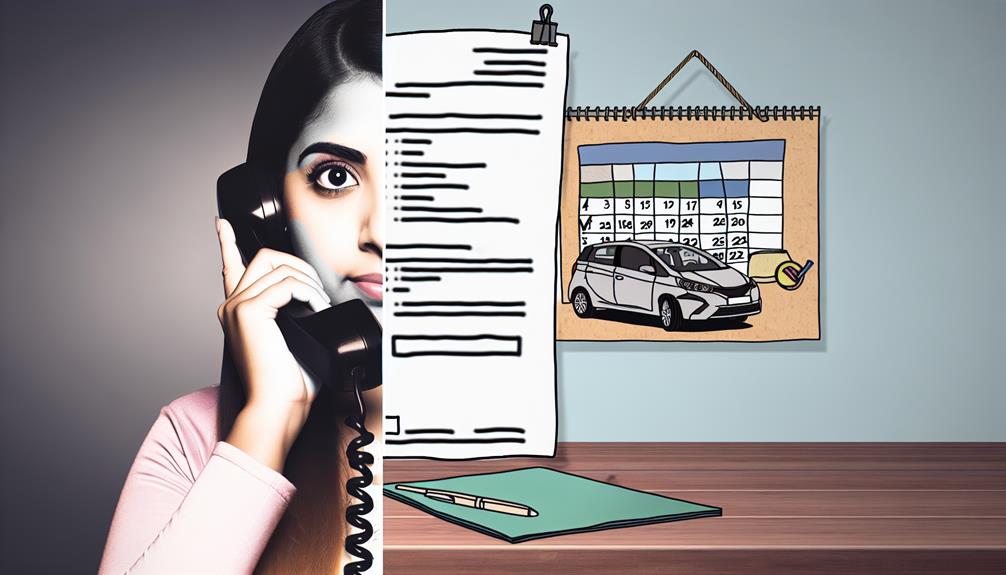To file a car insurance claim, you'll need to act quickly and follow specific steps. First, notify your insurance company immediately after the accident, providing detailed information, including date, time, location, and witness statements. Take thorough photos of vehicle damage, the accident scene, and any injuries. Submit claim forms and additional documentation requested by the adjuster, adhering to policy deadlines to prevent claim denial or delays. Understanding your policy coverage and gathering necessary documentation will help streamline the process. Now, let's break down the key steps and what to expect as you navigate the claims process.
Key Takeaways
- Notify your insurance company immediately after the accident to initiate the claims process.
- Gather detailed information, including date, time, location, witness statements, and police report number.
- Document vehicle damage, the accident scene, and any injuries with clear, comprehensive photos.
- Submit claim forms and requested documentation to the adjuster to facilitate the investigation.
- Adhere to policy deadlines to prevent claim denial or delays in the claims process.
Filing the Insurance Claim
Filing a car insurance claim promptly is essential to a smooth claims process. You should notify your insurance company as soon as possible after an accident, regardless of who's at fault. When you file a claim, provide the insurance company with detailed information about the accident, including the date, time, and location, as well as any witness statements and the police report number.
Gathering and documenting damages is significant. Take photos of any damage to your vehicle, the scene, and any injuries you sustained. Also, be prepared to submit claim forms and additional documentation as requested by the insurance adjuster. Keeping detailed records of your interactions with your insurance company will also be beneficial in case of future reference. You'll need to track the dates and times you contact your provider and note the names of representatives you speak to.
You must file a claim within the specified deadlines in your policy, which varies from insurer to insurer. This is necessary to prevent your claim from being denied or delayed in processing.
Understanding Policy Coverage
When it comes to understanding policy coverage, you'll want to familiarize yourself with the various types of coverage included in your car insurance policy. Your auto insurance policy typically includes liability, collision, and extensive coverage, each serving a distinct purpose in protecting against different risks. Liability coverage, which is mandated in most states, pays for damages to other people's property and medical expenses if you are at fault in an accident.
Collision coverage helps pay for the repair or replacement of your own vehicle after an accident, regardless of who is at fault. Comprehensive coverage protects against non-collision incidents like theft or natural disasters. Many policies also offer uninsured/underinsured motorist coverage, which provides financial protection if you are involved in an accident with a driver who lacks sufficient insurance. Additionally, Personal Injury Protection (PIP) is an optional coverage that can help cover medical expenses and lost wages for you and your passengers, regardless of fault in an accident. Review your insurance information to understand what's included in your policy coverage and what's not.
Working With the Adjuster

Now that you have a solid grasp of your policy coverage, it's time to focus on the process of working with the adjuster assigned to your claim. Expect the insurance adjuster to contact you within 1-3 days after filing your claim to initiate the evaluation process. Make certain to note the adjuster's name and contact information for future reference.
| Action | Description |
|---|---|
| Contact your adjuster | Reach out to your adjuster to confirm receipt of your claim and ask about the next steps. |
| Provide requested information | Promptly provide any requested information, such as repair estimates or witness statements, to facilitate a smooth investigation. |
| Document all interactions | Keep a record of all interactions with the adjuster, including dates, times, and summaries of discussions. |
Be prepared for the adjuster to review police reports and witness statements as part of the claim assessment process. The adjuster will assess vehicle damage and may require repair estimates from your chosen repair shops to determine compensation. By maintaining clear communication and documenting all interactions, you can help guarantee a smooth and efficient claims process.
Claim Processing Timeline
Upon completing the initial steps with your adjuster, the claim processing timeline unfolds. The insurance company will typically acknowledge your claim within 1-2 business days after filing. This initial acknowledgment is a vital step in the process, as it lets you know that your claim has been received and is being reviewed.
The investigation phase can vary in duration, potentially taking weeks depending on the complexity of the claim and the availability of necessary documentation. On average, claim resolution time is about 30 days, but this can extend for complicated claims requiring additional information or assessments. It is important to follow up regularly to check the status of your claim and provide any additional information requested by the insurer to avoid delays.
Once your claim is approved, the insurance company is required to issue payment within five business days, assuming all documentation is in order. Keep in mind that the insurance company will let you know if any additional information is needed to process your claim. Staying informed and proactive throughout the process will help you navigate the claim processing timeline efficiently.
Common Claim Issues

As you navigate the claim processing timeline, it's not uncommon to encounter issues that can complicate or even delay your claim. One common issue is disputes over fault determination, which can lead to delays and potential claim denial if the insurer finds insufficient evidence of liability. To avoid this, make certain you have a thorough police report and sufficient documentation, including photos of the accident scene and witness statements.
Insufficient documentation can also result in claim denial or a lower payout than expected. Verify you have all necessary documents, including the police report, repair estimates, and medical records. Delays in communication with the insurance company can also cause frustration and hinder the timely processing of claims. Stay proactive and follow up regularly to make certain your claim is being processed efficiently.
Additionally, be aware of state laws regarding claims and coverage, as different regulations may apply to fault determination and compensation limits. Understanding these laws can greatly impact the claim process and outcomes.
Initial Steps After Accident
After an accident, you're faced with a whirlwind of decisions, but taking the right steps from the get-go can greatly impact your car insurance claim. To guarantee a smooth process, it's vital to take immediate action.
| Step | Action | Importance |
|---|---|---|
| 1 | Contact your insurance provider | Report the incident, even if minor |
| 2 | Gather information | Collect names, contact details, insurance info, and license plate numbers |
| 3 | Document the scene | Take clear photos of damages, road signs, and conditions |
| 4 | Secure witness statements | Get statements from witnesses to support your claim |
When filing a claim after a car accident, it's imperative to document everything. This includes the time and date of the accident, as well as any weather conditions that may have impacted the situation. By taking these initial steps, you'll be well-prepared to file a claim with your insurance provider. Remember to stay calm and methodically gather all necessary information to guarantee a successful claim process.
Utilizing Mobile Apps

The mobile apps offered by many insurance companies can greatly simplify the claims process. You can file a claim directly from the accident scene using your mobile app, which streamlines the process for quick initiation. Many of these apps allow you to Take photos of the damages and the accident scene, making it easier to provide necessary documentation to the insurer. This feature is particularly useful as it saves you time and effort in gathering and submitting evidence.
You can also check the status of your claim in real-time through the app, ensuring you stay informed about the progress without needing to make phone calls. Some mobile apps even provide tools to recreate the accident scene visually, which can help in the claims investigation and clarify details of the incident. Additionally, you can schedule appraisals and reserve rental cars through the app, adding convenience for those needing immediate assistance after an accident. By utilizing your insurance company's mobile app, you can efficiently manage your claim and get back on the road quickly.
Documentation Requirements
Your car insurance claim's success largely depends on the documentation you provide. To guarantee a smooth process, gather essential documents, including your policy number and details of the accident. If you've filed a police report, obtain a copy to submit with your claim. Take clear photos of the accident scene, vehicle damage, and any relevant property damage to serve as evidence.
Collect witness statements and contact information, as they can provide vital support for your claim during the investigation process. Don't forget to capture the other parties' insurance details, including their policy numbers and contact information. Organize your records by maintaining a log of all communications with your insurance company, including dates, times, and names of representatives.
Claim Resolution Process

Within one to three days of filing your claim, an insurance adjuster will typically be assigned to evaluate your case. Their role is to assess the damage to your vehicle, evaluate any personal injury claims, and determine the compensation amount. To do this, they may require repair estimates from your chosen repair shops.
The investigation phase can vary in duration, taking anywhere from a few days to several weeks, depending on the complexity of your claim and the need for additional documentation. Throughout this process, it is vital to maintain open communication with your insurance company, as they'll provide updates and may request further information to facilitate the investigation.
Some key aspects to keep in mind during the claim resolution process include:
- Responding promptly to requests for information from your insurance company
- Keeping detailed records of all correspondence and communication
- Ensuring all damages and expenses are accounted for
- Reviewing your policy to understand what's covered
- Asking questions if you're unsure about any part of the process
Once the investigation is complete, your insurer will present a settlement offer. It is important to carefully review this offer before accepting it.
Payment and Follow-Up
After your claim is approved, the insurance company will issue payment, and if you're using your own insurance, your deductible will be subtracted from the total payout. Typically, the insurance company is required to issue payment within five business days. Keep in mind that if you have replacement cost coverage, you may receive two separate payments. In some cases, payments may be sent to the mortgage company if applicable.
It's crucial to maintain a record of all communications and documents related to the payment process to guarantee transparency and clarity with your insurer. If you dispute the amount of the payment, contact your insurance company with supporting documentation to negotiate a resolution. Don't hesitate to follow up with your insurance adjuster or company to check on the status of your claim and guarantee timely processing of payments. Regular follow-ups will help you stay informed and avoid delays. By staying on top of the payment process, you can guarantee a smooth and efficient experience when filing a car insurance claim.
Frequently Asked Questions
What Are Three Important Tips on Filing an Auto Insurance Claim?
When managing auto claims, you'll want to avoid common mistakes. First, prioritize accurate claim timelines – delaying notifications can complicate your eligibility and processing. Next, thoroughly fulfill documentation requirements, as inadequate records may stall or invalidate your claim. Finally, confirm what your insurance company requires from you and plan accordingly. This prep will minimize unnecessary back-and-forths, speeding up your overall claims experience and resolving any potential disputes efficiently.
What Is the Best Way to Make an Insurance Claim?
When dealing with unexpected events, you'll want to report the incident to your insurance company promptly, ideally within 24 hours. Create a claim documentation checklist to gather necessary info, and be aware of common claim mistakes to avoid. Have clear claim timeline expectations and utilize your provider's app or online portal for a smooth process. This will help you navigate the situation efficiently and minimize potential issues.
How to Put in an Insurance Claim?
When putting in an insurance claim, you'll want to avoid common mistakes that can delay the process. Start by understanding your coverage limits to know what's included. A claim process overview will help you prepare the necessary documents and evidence. Review your policy to guarantee you're filing correctly. Don't forget to document everything and keep records of communication with your insurer. This will help you navigate the claim process smoothly.
Do You Need a Police Report to File an Insurance Claim in Texas?
When dealing with a car accident in Texas, you're likely wondering if a police report is required. While not always necessary, it's strongly recommended, especially if damages exceed $1,000 or injuries occur. Having a police report can support your claim, provide legal protection, and expedite the process. Insurance companies may request it to determine fault or assess damages. It's best to file a report to guarantee a smoother Texas claim process and avoid potential filing timeline complications.
Conclusion
You've successfully filed your car insurance claim. Now, it's crucial to stay on top of the process. Keep track of your claim's progress, and don't hesitate to reach out to your adjuster or insurance company if you have questions or concerns. Make certain you understand the payment terms and follow up on any outstanding issues. By being proactive, you'll help resolve your claim efficiently and get back on the road quickly. Review your policy to avoid similar issues in the future.






